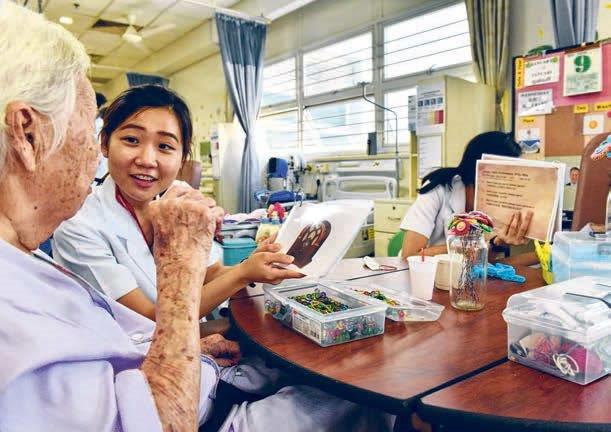Geriatric ward nurses equipped with skills to manage dementia-related behavioural issues
The Straits Times (10 January 2019) - In one special ward at Tan Tock Seng Hospital, the soothing sounds of Chinese oldies can be heard playing on a speaker.

Research assistant Eileen Fabia Goh engaging a patient with flash cards in Tan Tock Seng Hospital's Subacute Geriatric Monitoring Unit. The ward caters to female patients admitted for other medical conditions but also suffer from dementia related delirium and behavioural problems which make them difficult to care for. ST PHOTO: JASMINE CHOONG
Behind the closed doors, nurses quietly engage patients in sorting puzzles, chatting about their childhood days, or even playing a game of mahjong.
These activities, tailored to improve the cognitive abilities of the older patients, are part of the specialised care in the Subacute Geriatric Monitoring Unit (GMU) of the hospital. The ward is meant for patients who suffer from delirium or behavioural problems associated with dementia, on top of other medical problems.
The six-bedded ward, set up in November 2017 to resolve some of the complexities of treating patients with dementia, has housed over 80 female patients to date.
These patients had been admitted for medical problems but were hard to care for in the general wards as they were uncooperative with treatment, or tended to wander.
Associate consultant at the hospital's Centre for Geriatric Medicine, Dr Lim Jun Pei, said patients with behavioural issues arising from dementia need greater engagement for effective rehabilitation, which nurses and therapists in general wards are unequipped to handle.
She said: "Nurses who do not have the technical know-how will have problems engaging and communicating with patients with behavioural issues due to dementia."
A team of 30 nurses working in the ward has been trained in intervention techniques to deal with issues such as wandering, aggressive behaviour and refusal to take food or medication.
The training provides nurses with knowledge on dementia-related topics, pharmacological and non-pharmacological treatment methods and diagnostic tests for the patients, among other things.
Senior staff nurse Nurul Shakilla, 29, who has worked in the unit since it was set up, said the nurses have to take note of patients' likes and dislikes and adapt accordingly.
Referring to a patient who is prone to wandering because she wants to go home, Ms Nurul said: "Sometimes we will just walk with her, and talk to her. She likes to talk about her past. When you start talking to her she gets distracted and eventually won't even think about going home anymore."
Patients in the GMU are assessed by doctors, nurses and therapists during weekly rounds to see if they can be discharged, either to their own homes or to community hospitals or nursing homes for further care. On average, a patient stays in the unit for two to three weeks.
The GMU caters only to female patients currently. "We would like a similar Subacute GMU for male patients as well, but it's still in the planning stage," said Dr Lim.
By 2030, the number of people with dementia in Singapore is expected to more than double to 103,000.